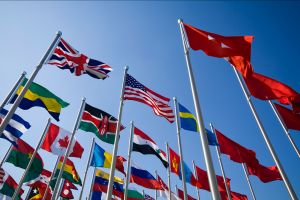Chicago Council and Asan Institute surveys conducted in 2019 find that both South Koreans and Americans see a strengthened US-ROK alliance as an asset in dealing with China, suggesting that Washington and Seoul can afford to strengthen coordination between their policies toward China.
Introduction
While Seoul and Washington currently agree on using high-level diplomacy to encourage North Korea to denuclearize, South Korean and US approaches toward China differ and could become a source of friction between the two allies. Under President Donald Trump, the United States has confronted China through tariffs on Chinese imports and identified China as a near-peer adversary. Meanwhile, South Korean President Moon Jae-in has made efforts to end a dispute with China over the Terminal High Altitude Area Defense (THAAD) system and indicated openness to China’s Belt and Road Initiative. Public preferences in both the United States and South Korea are not necessarily aligned with their own governments’ policies toward China. Chicago Council and Asan Institute surveys conducted in 2019 find that both South Koreans and Americans see a strengthened US-ROK alliance as an asset in dealing with China, suggesting that Washington and Seoul can afford to strengthen coordination between their policies toward China.
Key Findings
- While Americans are divided over US tariffs on Chinese goods (49% support, 47% oppose), they decidedly prefer a cooperative approach toward Beijing. Sixty-eight percent of Americans say the United States should undertake friendly cooperation and engagement with China rather than try to limit Chinese power.
- South Koreans are generally more cautious in dealing with China. While half prefer that South Korea undertake friendly cooperation (52%) with China, 40 percent want to actively work to limit Beijing’s power.
- Three-quarters of South Korean respondents (78%) say that South Korea should prioritize strengthening ties with the United States over those with China, whereas 14 percent say ties should be strengthened with China over the United States.
- In 2018, 66 percent of Americans said the United States should prioritize building up strong relations with Japan and South Korea over relations with China. Only 26 percent favored building a new partnership with China over Asian allies.
Methodology
The analysis in this report is based on data from the 2019 Chicago Council Survey of the American public on foreign policy, a project of the Lester Crown Center on US Foreign Policy. The 2019 Chicago Council Survey was conducted June 7-20, 2019 by IPSOS using their large-scale nationwide online research panel, KnowledgePanel, among a weighted national sample of 2,059 adults, 18 years of age or older, living in all 50 US states and the District of Columbia. The margin of sampling error for the full sample is ±2.3, including a design effect of 1.1607. The margin of error is higher for partisan subgroups or for partial-sample items.
Partisan identification is based on respondents’ answer to a standard partisan self-identification question: “Generally speaking, do you think of yourself as a Republican, a Democrat, an Independent, or what?” The analysis of South Korean public opinion is based on data from The Asan Institute for Policy Studies’ 2019 public opinion survey. The survey was conducted July 9-10, 2019 by Research & Research, using RDD (Random Digit Dialing) for mobile and landline phones and the CATI (Computer Assisted Telephone Interview) method. Data was weighted by age, gender, and region to create a nationally representative sample (n=1,000 adults ages 19+). The margin of sampling error is ±3.1 at a 95% confidence level.
Ideological stance is based on respondents’ answer to the following question: “What is your ideological stance? Please, indicate on a scale from 0 to 10, with 0 being very progressive, 5 being moderate, and 10 very conservative.” For analytic purposes, we recoded the answers into three categories as follows: progressive (0 to 4), moderate (5), and conservative (6 to 10).




